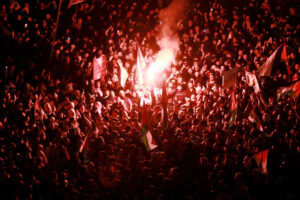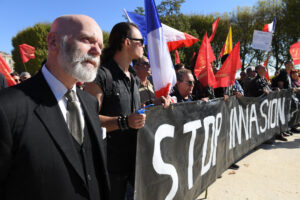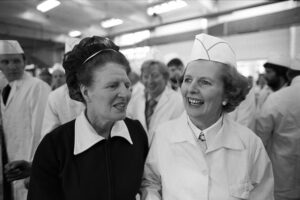Russian Scholars
Facing Zugzwang

In chess, there is a concept known as zugzwang: a situation where every possible move leads to the deterioration of the mover’s position. Two years after the onset of full-scale aggression, Russian scholars, even those who have never played chess, can understand this concept all too well. Those within the country are silenced by repression and fear, while those fortunate enough to leave bear the burden of shame and horror.
Opening
The renowned Soviet physicist Lev Landau once remarked, “Sciences could be divided into natural, un-natural, and counter-natural.” This joke contained a grain of truth: Soviet humanities—un-natural sciences—were highly ideologized, largely operating under the deadening influence of dogmatic Marxism-Leninism, and therefore subject to strict oversight by the state. By contrast, representatives of the natural sciences were particularly valued by the communist regime for their contributions to military knowledge production—and so enjoyed greater independence, at times to the point of open defiance (as in the case of a number of politically-minded physicists, such as Andrei Sakharov, Oleg Orlov, Andrei Tverdokhlebov, and Valery Chalidze).
However, such independence was reserved only for academicians of the Soviet Academy of Sciences, the most prestigious academic institution of the USSR. Those working in research institutes under the Academy’s jurisdiction—comprising no more than seven percent of the scientific and educational workers in the USSR—were protected from the capricious political authorities operating within their institutions. But of course, their special financial privileges and even limited academic autonomy were always curtailed by the strict surveillance of the security services, which, although not interfering with research, imposed restrictions such as prohibiting travel even to socialist countries and controlling scientific publications. Most scholars outside the Soviet Academy of Sciences, numbering in the hundreds of thousands, lacked even that freedom and adequate salaries.
As a result, Soviet science was not homogeneous. At the top stood the natural scientists (notably mathematicians, physicists, and chemists), who achieved recognition far beyond the borders of the USSR. By contrast, the recognition and fame of humanities scholars were minimal, mainly due to limited publication activity in foreign languages and the toxic influence of Marxism-Leninism.
After the collapse of the USSR, Russian science and higher education would have to find their way in an unfamiliar world where much was up for grabs. The re-named and once-vaunted Russian Academy fragmented into two competing sides, which can be broadly labeled globalists and nativists.
The 1990s were challenging for Russian science and higher education. On the one hand, Russian science could finally breathe freely from ideological pressure for the first time in many years. It significantly impacted the humanities and social sciences and, to a lesser extent, STEM fields. STEM was already relatively free since the communist doctrine did not create an alternative physics, unlike the humanities.
On the other hand, the humanities, freed from the shackles of communist ideology, could not immediately become part of the global community: this required time, numerous publications in English, and some critical self-assessment of the Soviet legacy. As a result, Soviet reputations in the humanities and social sciences, like the Soviet ruble, turned out to be poorly convertible. Only a few from the late Soviet humanities were accepted by the Western global community.
For post-Soviet STEM, this was a significant problem—Soviet natural sciences had a high reputation worldwide, and their only issue in the liberated 1990s was the simple fact that “freedom comes naked” (i.e., freedom does not bring prosperity). While a pencil and notebook were sufficient for a humanities scholar at the time, a natural scientist, especially an applied one, needed a laboratory. The 1990s brought a disaster here. Those natural scientists who had the opportunity to conduct research within military programs were left without funding as the Soviet military machine collapsed. At the same time, Russian science and higher education were left almost without funding, so much so that there was often insufficient money to pay scholarships and meager salaries. This development led to enormous disappointment among a significant part of the Russian Academy, even making the Soviet era’s lack of freedom more attractive to many.
In the 90s, during economic and political instability, globalists mainly tried to survive in the new environment by obtaining education abroad, participating in international projects, publishing books, and defending dissertations in Western universities. Although few, this select group of scholarsand educators spearheaded reforms in educational and research institutions, which became visible and challenging for the rest of Russian academia.
The second, more significant segment of Russian science and higher education gained little from the long-awaited freedom. These are the nativists. To be accepted into the global knowledge community, one had to write, publish, and read in English and cease doing what many considered normal: delivering the same lectures repeatedly for decades. Scientific achievements from the Soviet era, for the most part, were difficult to convert into recognition and prestige in the new Russia, which created significant resistance to reforms. Meanwhile, many professors privately considered the old Soviet system superior to the global community. They viewed higher education reformers as frauds and underachievers who, “with Western money,” were perverting “the world’s best Soviet education” by introducing the Bologna process (the process of unification of the European higher education system that Russia joined in 2003).
This group of researchers and educators, burdened with increased workloads and the obligation to publish (despite a noticeable lack of time for research), were in a precarious position made worse by short-term contracts and complete dependence on their superiors. How could they compete? Instead, nativism proposed convenient Soviet-style isolation of science and protection from global competition.
The return of the state to the field of science and higher education occurred during Putin’s first term as president. It was accompanied by a sharp increase in funding, as well as serious demands for raising the global recognition of Russian universities and international scientific projects. Russia actively engaged in the field of higher education through authoritarian modernization. This process had different impacts on various groups within the Russian Academy.
Given the officially “liberal” orientation of the Russian state at the time, these groups, though they rarely intersected, were in a relative equilibrium: globalists developed successful projects in higher education and science, creating effective institutions, while nativists unsuccessfully attempted to interfere as the more significant part of the Russian Academy engaged in integrating into the new system, losing much of its hallowed autonomy and academic freedom along the way.
Among the notable successes achieved by the globalists, both state and non-state projects in the field of higher education emerged, such as the Higher School of Economics, the School of Higher Economic and Social Sciences (Shaninka), the European University at Saint Petersburg, and the Faculty of Artes Liberales at Saint Petersburg State University. All these institutions are evidence of the success of Russian humanities and social sciences, demonstrating the freedom and advantages of open, ideology-free scientific inquiry. The father-founder of HSE, economist Yaroslav Kuzminov, published an article on academic freedom, where he called academic freedom an “inseparable element of academic convention”.
The problem was that all these projects were “islands of freedom” within the ocean of post-Soviet nativism. This became evident after February 2014.
Middlegame
The annexation of Crimea and the conservative turn in Russian politics, heralded most clearly by the beginning of Putin’s third term in 2012, struck the first blow against the globalist/nativist equilibrium: the Russian government ceased to be “liberal” and officially became conservative.
Those former globalists who had successfully built a “vertical of power” in Russian universities, similar to what Putin had constructed across the country, could use it for proactive management and disseminating the state’s new conservative ideological policy in universities. Initially, this dissemination was moderate and only affected specific disciplines, with history, gender and LGBT studies, public sociology, and political sciences coming under attack first.
The rest of the globalists, who were out of the official positions, optimistically regarded the situation as “serious but not hopeless”: despite the severe curtailing of civil liberties in the country, the “pockets of efficiency” within the Russian Academy were still needed by the authorities, so, somewhat paradoxically, the activities of the globalists were not significantly affected. Moreover, the globalist community did not react strongly to the annexation of Crimea despite loud protests from the Ukrainian Academy. One of the only notable cries of dissent came from Professor Andrey Zubov of the Moscow State Institute of International Relations, who publicly protested against annexation, compared Putin with Hitler, and found pointed similarities between Crimea and the Anschluss of Austria in 1938. He was immediately fired from the institute and lately emigrated. Most globalists, though, accepted “peaceful annexation” and shared this patient attitude with most of the international community. Nevertheless, there were increasing restrictions on their research and knowledge production, especially on topics that officially “contradicted the traditional values.” Since international cooperation, the Bologna Process, and publications in English-language literature were clearly in favor of the globalists, it was the nativists who welcomed the trend toward isolation with joy. On the one hand, they wanted international recognition, but on the other, they increasingly talked about the priority of “national science” over “global science.” Disciplines with a distinctly nativist flavor emerged, such as “Orthodox sociology” at Moscow State University.
This divide was also clearly manifested in the political sphere. As sociologists Mikhail Sokolov and Kirill Titaev wrote in 2013, “in Russian social science… the divide between those who believe that reading Western books is more important than Russian ones (globalists) and those who are convinced of the opposite (nativists) more or less follows the line separating Bolotnaya Square from Poklonnaya Hill (i.e., from the site of anti-Putin protests to the site of regular pro-Putin rallies).”
The annexation also saw the irruption of a small but visible group of ultra-patriots that became active in Russian higher education, outdoing the nativists. These hardline nationalists proposed various theories and concepts that would allow Russia to break free from oppressive European norms and rules. They declared Russia a “unique civilization.” During the first decade of the 21st century, this group was relatively small and not very influential. However, they were becoming increasingly popular among the anti-Western part of the Russian elite in the 2010s. For example, the historian Natalia Narochnitskaya wrote Russia and Russians in World History (2008), which interpreted the fall of the USSR as the consequence of barbaric Western aggression against Eastern civilization. The philosopher Alexander S. Panarin’s Orthodox Civilization in the Global World (2002) is a vigorous defense of Orthodox spirituality against Western capitalism and Igor Froyanov’s dedicated his book on the Russian history in the 20th century Diving into the Abyss to the “Defenders of the Soviet Great Power” (Derzhava)”
At the time of the conservative shift, ideas of total isolationism did not fit with Russian foreign politics. The situation again changed dramatically after February 2022.
Endgame
The consequences of the full-scale war of aggression differed for each group of the Russian Academy.
Immediately after the war began, many Russian scholars, like the Russian citizens themselves, actively protested (so unlike the passive acquiescence eight years earlier). They vainly and plaintively argued that the war excluded Russia from the global realm of knowledge. The protests were quickly suppressed once it became clear that the Kremlin was ready not only to intimidate but also to imprison those holding peace placards.
The globalists were stunned in the face of this horror. Everything they had worked for turned to dust: international projects closed, Russia left the Bologna process, academic exchange programs ended, and the rapid deglobalization of Russian science and higher education began. State-loyal globalists were offered a plan for “alternative globalization”—to develop science and higher education with BRICS countries (Brazil, Russia, India, China, South Africa, now including Iran, Egypt, Ethiopia, and the United Arab Emirates). Many globalists used their international connections to leave Russia, further accelerating the deglobalization process. Some globalists considered the war “a bit dramatic but not concerned with the science as usual”. They were deeply disheartened by the sharp reaction of the foreign academic community to the war, which ceased cooperation in most educational and research projects. The exclusion of Russian universities and researchers from international cooperation caused the globalists acute whataboutism; they actively recalled all the issues for which American scientists were not excluded, such as the Vietnam War.
The nativists—even those who are against the war—firmly believed that most of the sanctions imposed were a result of “Russophobia” and proved the “violation of the neutrality of science.” Because they weren’t very much attached to global knowledge production, they were most affected by sanctions only symbolically, and the academic boycott increased their view of the exclusivity and uniqueness of Russian science and higher education.
Finally, a small but noticeable part of the anti-Western-oriented Academy—among them many ultra-patriots—found itself on a high horse: it not only celebrated the break with the “Russophobic Western Academy” but also used wartime to seek out “traitors” among teachers and staff, fully supporting the militarization and ideologization of science and higher education.
As always, the divisions between globalist, nativist, and ultra-patriot are porous: a rare but impressive example of the relocation from the global to the ultra-patriot camp is the case of chemist Artyom Oganov, who is a well-known crystallographer and worked previously in Switzerland and the USA. After the war started, he returned to Russia where he promptly began to accuse foreign countries of a “global war” against Russia. He also claimed the need to investigate those Russian scholars who became a part of the Western “anti-Russian soft power.”
Ultra-patriots are now on the advance, not only declaring the sovereignty of Russian science but proclaiming the needs to develop principles of “true national” humanities and social science. For example, the current dean of the Department of Political Science, Moscow State University, Professor Andrey Shutov, recently declared the beginning of the sovereignization of Russian political science when he said, “The basis for reading theoretical and fundamental disciplines should lie in the concepts of domestic scientific schools and the achievements of domestic political science.”
Zugzwang
This is the situation that Russian scholars find themselves today, in which every move they make leads to a loss—zugzwang. What would you do?
Decide to stay and protest? Your protest will not go unnoticed: the Russian government has already created a system for identifying “traitors” in universities, and your protest could cost you your job or even your freedom.
Decide to stay and remain silent? You will need to accept what is happening inside Russian universities, where “veterans” of the “special military operation” (as Russian officials call the war against Ukraine) are starting to work as administrators and lecturers. Additionally, some students are creating paramilitary units to “support our army.”
Decide to focus on your science? Whatever it is, your field is increasingly seized by “patriots,” for whom loyalty is far more critical than any scientific achievement. And if you are a specialist in the humanities or social sciences, then you face overtly ideological courses and programs that are being actively introduced as mandatory, and all Russian students must go through them.
OK, you decided to leave—but where? Many European countries do not issue visas to Russian citizens, and if you don’t have evidence of political persecution, you won’t get a visa. At the same time, it’s clear to many scientists that departure represents a severe blow to their careers and work, a loss of colleagues, and, for many, the end of their entire scientific career built in Russia.
Those who leave often find themselves in Europe as “citizens of an aggressor state,” which complicates ordinary life and leads to practices that would previously have violated academic freedom. Now, responding to them as citizens of a country that started a war becomes practically impossible due to shame and horror.
The result of this zugzwang is forced silence. In Russia, it’s the asphyxiation of the public intellectual—when people are silent not only out of fear but because of the disappearance of public space. Abroad, it’s more like aphonia, where speaking about the problems of Russian scholars and Russian education in exile can only be done in whispers, as Ukraine’s tragedies loom large.
Of course, as chess textbooks often suggest, zugzwang is not always real. Sometimes illusory: a valuable move exists. Still, the player doesn’t see it, overwhelmed by emotions, and thus resigns to defeat, refusing to seek a way out.
We are all, undoubtedly, overwhelmed by terror, anger, catastrophe, and despair—paradoxically, this gives hope that there is a way out. But we do not see it yet.


